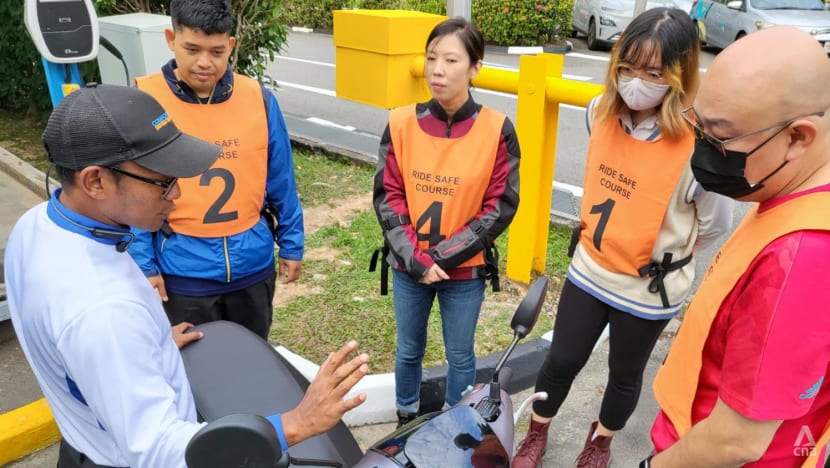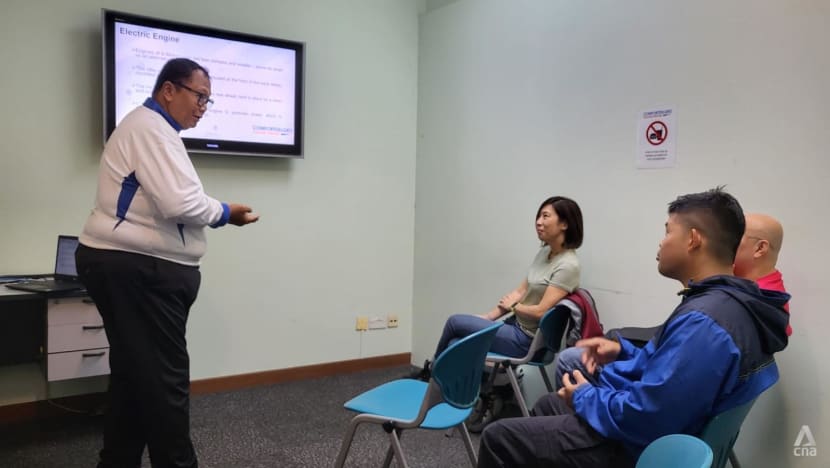More electric motorcycles on Singapore's roads but speed bumps ahead for mass adoption
Consumers are wary of buying in due to the price and a lack of charging facilities, said industry experts.

Students listen to an instructor during an electric motorcycle familiarisation course. (CNA/Jeraldine Yap)
SINGAPORE: There were more electric motorcycles on Singapore’s roads in the past year, but the numbers remain low, and a majority were from firms looking to green their fleets.
As of January this year, there were 117 registered electric motorcycles. Despite the small figure, it was more than a 20-fold jump from just five such bikes in 2021.
Of the total, only two are owned by individuals – the rest are registered under companies and organisations.
Industry experts said consumers are wary of buying in due to the price and a lack of charging facilities.
Compared to regular motorcycles, electric ones do not use gear shift, and can accelerate much quicker. They are also quieter, more energy efficient, and generate less pollution.
FIRMS USING E-MOTORBIKES
The ComfortDelGro Driving Centre in Ubi jump-started its electric motorcycle course last month, riding on a wave of growing interest in greener vehicles.
One such trainee is Ms Peline Ong, 50, who said she wants to be ready when these environmentally-friendly motorcycles become more popular and readily available in the future.
“I took up the e-motorbike course to familiarise with what is in the market, and what are the options that I have in the event I want to switch to an e-motorbike,” she said.
“It is very useful because you don't want to be left with no options and when the time comes, we’re going to be scrambling for a course.”
The course is only available to those who already have a valid motorcycle licence.

The training takes half a day, including theory and practical sessions. It familiarises students with the electric two-wheeler's control and devices, as well as guidelines on its use in Singapore.
WHY AREN'T CONSUMERS BUYING E-MOTORBIKES?
There are about 143,000 registered motorcycles in Singapore, according to the Land Transport Authority (LTA). Most of them are internal combustion engine motorbikes.
Consumers said they are apprehensive about purchasing an electric motorcycle partly due to the price tag – they cost around 50 per cent more than their petrol-guzzling counterparts.
Charging is another issue. Detachable batteries cannot be charged at home, and current electric vehicle (EV) charging points scattered around the island are mainly for cars.
.jpg?itok=C4Pls6vv)
“The charging is a serious consideration. Right now the charging takes 45 minutes so there’s downtime,” said Ms Ong, when asked if she would purchase an electric motorcycle after her training.
“A market where there is a standardised battery that is convenient to swap anywhere, like at petrol kiosks, will encourage a lot more people to look into e-motorbikes," she added.
The market’s reluctance to make the switch can cause speed bumps in Singapore’s plans to phase out fossil-fuel vehicles by 2040, observers said.
CHARGING AND INFRASTRUCTURE
Hoping to help overcome the charging issue, local start-up MO Batteries is testing electric motorcycles with swappable batteries.
The firm said that despite the meagre number of electric motorcycles on the road at the moment, there is keen interest among businesses and within the riding community.
“The feedback we have had so far is overwhelmingly positive. The drivers love the vehicles and the corporations love the fact they are able to reduce their emissions,” said the company’s founder Tom Streitberg.
The company is ready to scale up, but needs to wait on more comprehensive government regulations on charging and batteries.
Existing laws for electric motorcycles only state what types of vehicles can be used on roads and expressways.
Mr Streitberg said that a network of convenient charging needs to become available before riders will be confident enough to swap out their motorcycles for the electric version.
Consumers and the trade's association hope the government can lead the charge in speeding up the mass adoption of electric motorcycles.
“In terms of solutions are having the battery swaps available, government supporting potential infrastructure or businesses (in this field), and incentives – like those for (electronic) cars – can be introduced for motorcycles as well,” said Singapore Motor Cycle Trade Association president Rex Tan.
While setting up the infrastructure will not be an easy ride and is expected to take a few years, industry players said they anticipate demand to shift into high gear once the groundwork is in place.




















